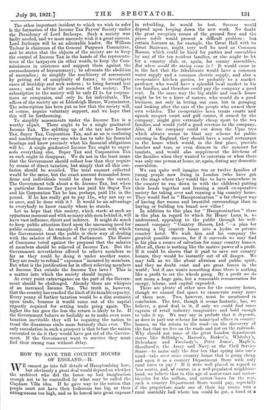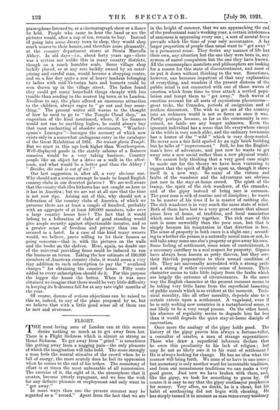HOW TO SAVE THE COUNTRY HOUSES OF ENGLAND.—IL W E cannot
go into full details of Hamptonizing here, but obviously a great deal would depend on whether the ' architect who did the house up had imagination enough not to be controlled by what may be called the Clapham Villa idea. If he gave way to the notion that people must not have their bedrooms too big, or their sitting-rooms too high, and so be forced into great expense in rebuilding, he would be lost. Success would depend upon keeping down the new work. No doubt the great reception rooms of the ground floor and the piano no(aile would present a difficult problem ; but certain features as, for example, the Great Hall with its Great Staircase, might very well be used as Common Rooms, which could be hired for parties and assemblies by any of the ten resident families, or else might be let for a country club, or, again, for county assemblies. But where would the saving come in ? It would come in in the fact that the inhabitants would have a common water supply and a common electric supply, and also a co-operative kitchen garden, let probably to a market gardener, who would have a splendid local market in his ten families, and therefore could pay the company a good rent. In the same way the big stable and coach house might be let to a hirer of motors, who would do a good business, not only in letting out cars, but in garaging and looking after the cars of the people who owned their own vehicles. The co-operative lawn tennis courts and. squash racquet court and golf course, if owned by the company, might give extremely cheap sport to the ten families, and would yield a good revenue to the company. Also, if the company could cut down the Upas tree which always seems to blast any scheme for public catering in England, they should have a small restaurant in the house which would, in the first place, provide lunches and teas, or even dinners in the summer for tourists, and would also supplement the kitchens of the families when they wanted to entertain or when there was only one person at home, or, again, during any domestic convulsion.
We can quite well imagine ten or twelve families of young people now living in London (who have got to the stage where they would like to have somewhere in the country to run down to with the children) putting their heads together and forming a small co-operative society for taking over and running a big country house. They would find in " Hamptonization " a far cheaper way of having fine rooms and beautiful surroundings than in buying or building ten brand new villas ! In addition to this plan for " Hamptonization " there is the plan in regard to which Sir Henry Lunn is, we understand, appealing to the public through his well- named company "Country Houses, Ltd. "—a plan for turning a big country house into a hydro or private country hotel. We wish him and his company the greatest possible success, for if it succeeds we may find in his plan a source of salvation for many country houses. After all, there is nothing like the motive power of a profit. If it could be shown that it paid to save our country houses, they would be instantly out of all danger. We may talk as we like about altruism and public spirit, and they no doubt exist and are great forces in the world ; but if one wants something done there is nothing like a profit to set the wheels going. By a profit we do not mean a huge gain, but a reasonable remuneration for energy, labour, and capital expended. There are plenty of other uses for the country house, though we cannot find space to enumerate many more of them now. Two, however, must be mentioned in conclusion. The first, though it seems fantastic, has, we believe, a good deal in it, if only we could find some captain of retail industry imaginative and bold enough to take it up. We may say in prelude that it depends, as does in part our scheme for municipal offices in country houses, on the return to the road—on the discovery of the fact that we live on the roads and not on the railroads. Why should not some of the great London department stores like Selfridge's, Harrod's, Barker's, Whiteley's, Debenham and Freebody's, Peter Jones', Maple's, Shoolbred's, the Army and Navy or the Civil Service Stores—to name only the first ten that spring into one's mind—take over some country house that is going cheap and open it as a country Department Store with only rural rates to pay ? If it were well placed in regard to 'bus routes, and, of course, in a well-populated neighbour- hood, we believe that in this age of motor-cars and motor- bicycles for the million, and motor-'buses for the rest, such a country Department Store would pay, especially if the proprietors made one of their big rooms into a rural assembly hall where tea could be got, a band or a gramophone listened to, or a cinematograph show or a dance be held. People who came to hear the band, or see the pictures would, after a cup of tea, remain to buy. Instead of going into some dreary town to shop, they would shop much nearer to their homes, and therefore more pleasantly, at the country department stores at Strata Marcella Abbey. In old days—i.e., about forty years ago—there was a system not unlike this in many country districts, though on a much humbler scale. Some village shop luckily placed, or at any rate luckily owned by an enter- prising and careful man, would become a shopping centre, and on a fine day quite a row of heavy landaus belonging to ladies with mid-Victorian hats and bonnets could be seen drawn up in the village street. The ladies found they could get many household things cheaply with less trouble than sending to the nearest big town or to London. Needless to say, the place offered an enormous attraction to the children, always eager to "go out and buy some- thing." The present writer still warms to the thought of how he used to go to "the Temple Cloud shop," an emporium of the kind mentioned, where, if his finances would not run to anything higher, he could always buy that most enchanting of obsolete sweetmeats, " Weather- spoon's Lozenges "—lozenges the memory of which now exists only in a somewhat ambiguous entry in the catalogue of the Great Exhibition of 18M. Sic transit gloria But we must in this age look higher than Weatherspoon. Well-displayed goods in the stately saloons of a Barocco mansion would be a very taking business. Country people like an object for a drive or a walk in the after- noon, and what would be a better goal than the Abbey ? "Besides, the cook is out of ice I" Our last suggestion is, after all, a very obvious one. Why should not a serious attempt be made to found English country clubs in our deserted palaces ? We are well aware that the county club idea hitherto has not caught on here as it has in America ; but we are not at all sure that the time is not now ripe. Arising out of this, why should not a federation of the country clubs of America, of which we presume there are at least a couple of hundred, probably with an aggregate of at least 100,000 members, take over a large country house here ? The fact that it would belong to a federation of clubs of good standing would give ample security against objectionable inmates, and so a greater sense of freedom and privacy than can be secured in a hotel. In a case of this kind many owners would, we believe, prove willing to let their houses as going concerns—that is, with the pictures on the walls and the books on the shelves. Here, again, no doubt one of the universal providing firms could be induced to run the business on terms. Taking the low estimate of 100,000 members of American country clubs, it would mean a very tiny addition to each subscription to pay the "overhead charges" for obtaining the country house. Fifty cents added to every subscription should do it. For this purpose the bigger the house the better. When it was once obtained we imagine that there would be very little difficulty in keeping its bedrooms full for at any rate eight months of the year.
Of course, dozens of serious objections can be raised to this as, indeed, to any of the plans proposed by us, but we believe that with a little good sense all of them can be met and overcome.



































 Previous page
Previous page